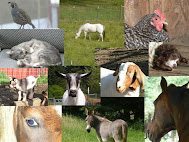Thanks for joining me on my series of posts about our daughter, H-Bob, and our discovery of her dyslexia and the effects of her diet. You can catch part one here.
June 2011
It all started with a Tweet. Someone who mentioned that she had just purchased a copy of How to Raise Your Strong Willed Child. It sounded like a good title to investigate. We used to tweet back and forth how H-Bob and some of her children exhibited over-the-top, strong-willed-child attributes. I tracked down a copy at our local library and started reading. It confirmed that I indeed have a strong-willed child. As an infant she cried continually...was sensitive to light, touch, all sounds, and motion. As a toddler, she was still whiny, a picky eater, always in motion. These all fell under the different personality traits outlined by the book. Fascinating and affirming that H-Bob was not the only such child on the planet.
Not so much a personality trait, but we noticed as a preschooler she had no interest in the printed letter although she loved to be read to and became skilled at drawing. Beginning reading lessons were met with resistance. Being able to distinguish sounds seemed difficult. It seemed as if she could not understand the concept of rhyming words. What we learned one day was forgotten the next. And forget anything that had to do with math. But back to the book. Sprinkled through the book were those disclaimer comments…if your child exhibits this or that, you might want to consider the possibility of a learning disability. Those little things that pricked at my insides and said, “What are you going to do with that information, now?”
There were references to several different other titles and online information to consider as follow-up materials to the book. I promptly checked out stacks of titles from our local library (just check my Shelfari shelf on the left-hand side of the blog) and entered the world of dyslexia. It didn’t take much more than that to clinch the fact that this was what we were dealing with. School was out for the summer, so we proceeded with what we had on our own. I brought it up with her wonderful vision therapist who told me her son was dyslexic and had eye abnormalities similar to H-Bob when he was young. She had already suspected that H-Bob was dyslexic but didn’t mention anything. H-Bob’s eyes needed to ‘see’ effectively before anything else remedial could be introduced. Interesting that she did not consider dyslexia a liability at this point. I would learn in time that dyslexia is a gift and not something to be feared.
As I mentioned in my much briefer posts here and here at the time, I’m not one to take things lying down. There simply had to be a reason for her dyslexia. Current information seems to point towards a hereditary link. To my knowledge that did not exist in our family. What else could there be? Here began my search. I first scoured the web to find more information that I knew where to start with. Luck had it that the first book I picked up at the library was Disconnected Kids. If I thought that Raising Your Strong Willed Child was an eye opener. This was a life-changer. Dr. Melilo outlines his take that dyslexia and anyone on the austism/Asperberger spectrum are dealing with conditions on just one front, with individuals with dyslexia being extreme right-brained and autism/Asperbergers on the left-brain scale. Due to various conditions, the two halves of the brain can become disconnected and either of those conditions can occur. One section of his book outlines how to test at home for those conditions, and the dyslexia became very clear. These situations can be reversed according to his protocol with retraining the brain to communicate to the other side through occupational therapy activities and by a diet change. We promptly started with activities that started communication between right and left brain and could see that anything left-brained oriented was so difficult for her. She lined up true to the symptoms of someone who has limited use of the left hemisphere...not too coincidentally, the language processing side of the brain concerned with reading.
There is way too much information to condense here…I’m already feeling like I’m rambling even there is so much to say…but getting to the diet part. That seemed like a bunch of crock. How could eliminating gluten, dairy, and sugar change the way one felt or thought? That’s all H-Bob lived on as she was such a picky eater.
BINGO.
That was the key, although we didn’t yet realize to what extent it would change her life.
Next up...food journaling and a new side to nutrition that we had never been exposed to.

 |


.jpg)












+(2).jpg)



0 comments - click here to leave your comments:
Post a Comment
I'd love to hear what you think, so leave me a message. Have a great day!